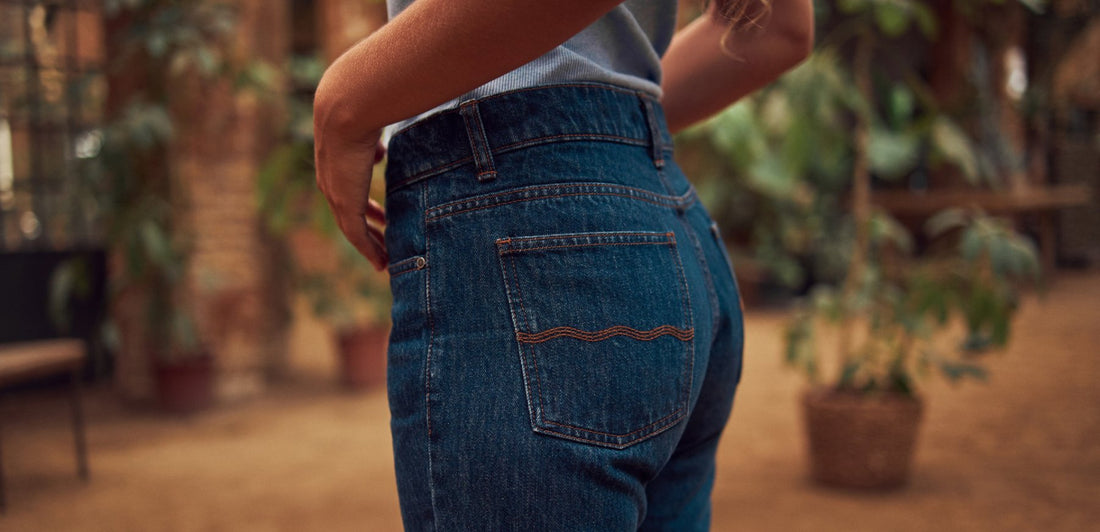Pressure is mounting on the fashion industry to change its ways. EU policymakers, as well as eco-conscious customers, are growing tired of brands greenwashing away their environmental responsibilities. It is increasingly the case that just because a garment is called “sustainable” doesn’t mean that it is. Sustainable jeans are no different in this regard. So what qualifies a pair of trousers as sustainable? Let’s take a closer look together!

No Sustainability Without Longevity
The first thing that any eco-conscious consumer should be aware of is that eco-friendly fabrics and sustainable fashion production processes are worth little if garments are not built to last. The Ellen Macarthur Foundation has calculated that 50% of all fast fashion garments are discarded within a year. This has a huge impact on precious natural habitats, as well as being incredibly water and carbon intensive.
It is for this reason that TWOTHIRDS, along with many other slow fashion brands, is pivoting away from obsessing over the marginal eco gains that can be made with sustainable fabrics and logistics processes, to instead do everything possible to make our eco-friendly clothes durable and long lasting. This is done by using high-quality organic and recycled materials, which are often more durable than their non-organic or virgin material counterparts. All our eco-friendly garments are also lovingly handcrafted in Europe, to ensure superior quality and longevity.
All TWOTHIRDS eco-friendly clothing is designed in such a way that it can be easily repaired and cared for. Most pieces also come with handy things like spare buttons (look out for more repair add-ons like this in the future!). This way, both the clothing maker and the eco fashion consumer can do their bit to extend the life of a garment. Our customer service team is also always on hand to help you prolong the life of a TWOTHIRDS garment.

Ultimately, you should always be aware that the best way to protect the ocean is to buy less new clothing and care for garments you already have in your sustainable wardrobe. This can often mean caring for fast fashion pieces instead of rushing to replace them with slow fashion items. For obvious reasons, this can be counterproductive for a sustainable fashion brand like ours to say, but it’s the truth!
Organic Or Recycled Cotton, Every Time
While renovating and caring for old clothing is the key to true, closed loop, sustainable fashion, there are of course times when there’s no option but to treat yourself to a new pair of organic denim jeans or sustainable trousers. When this happens, the only way to go is to opt for those garments made from organic cotton, such as the natural varieties used in the majority of our Ocean Denim range.
The reasons for this are manifold, such as organic cotton having far reduced water and carbon footprints than standard cotton. It is also cultivated without the use of harmful pesticides, meaning it’s ideal for people with sensitive skin. We swear it feels softer on your skin too!

The only option that’s arguably better for the environment than organic cotton fabric is recycled cotton. The benefits of recycled materials are obvious: no new raw materials need to be cultivated or produced, with pre-existing materials being repurposed instead. We are on a mission to include more and more recycled cotton in our sustainable denim offering. A good example is our new Kiritibati jeans for women.
Thread, Linings & Binding Matter Too
While you should ensure that the main base fabric of any pair of jeans is organic or recycled, that will not tell you the full story of what your jeans are made of. Keep in mind that the main fabric does not account for thread, pocket linings and binding.
On most of our sustainable jeans we ensure that all pocket linings and binding are crafted from organic cotton. Whenever this happens not to be the case, we will be open and honest about the alternative we have opted for. When it comes to thread, we tend to shun the use of virgin polyamide and opt instead for thread made from recycled polyamide. We also only use nickel-free zippers, rivets and buttons. It is this sort of attention to detail that sets TWOTHIRDS apart from the sustainable fashion crowd.

Dyes & Washes That Care For Rivers & Oceans
Part of the great allure of a pair of jeans is their distinctive colour and faded wash. Unfortunately, such enticing features often come at a cost to the environment. Many fast fashion brands continue to use harmful dying and washing processes, which release chemicals and tainted waste water directly into rivers and oceans.
Here at TWOTHIRDS we go against the fast fashion flow, opting instead to use e-Flow dyes and washes. This revolutionary dying system imbues jeans with vibrant colours thanks to nanobubble technology. This means that virtually no water or chemical discharge takes place, but your new sustainable jeans look incredible all the same.

Sustainability Also Depends On The Wearer
We are firm believers that true sustainability can only ever be achieved when we work together, as part of an ocean-loving community. It’s why we try to provide as many tools as possible for our community to grow and learn. We do this by writing garment care blog articles, updating our followers about sustainable fashion trends via our social media feeds, and always being on hand to help TWOTHIRDS customers eke every last drop of sustainability and longevity from our eco-friendly clothes.
Some of the ways that you, the consumer, can increase the sustainability of your organic and recycled denim jeans is to wash them less, wash them in a bag especially made for catching microfibres, and air drying them naturally, rather than in a tumble dryer. You can also use natural bio washing detergents. Last but not least, you can spread the word about the sustainability benefits of shopping an eco-friendly fashion brand like TWOTHIRDS.
This way, if we do our part for the ocean, and you do the same, then we’re bound to leave behind a cleaner and healthier planet for future generations.








